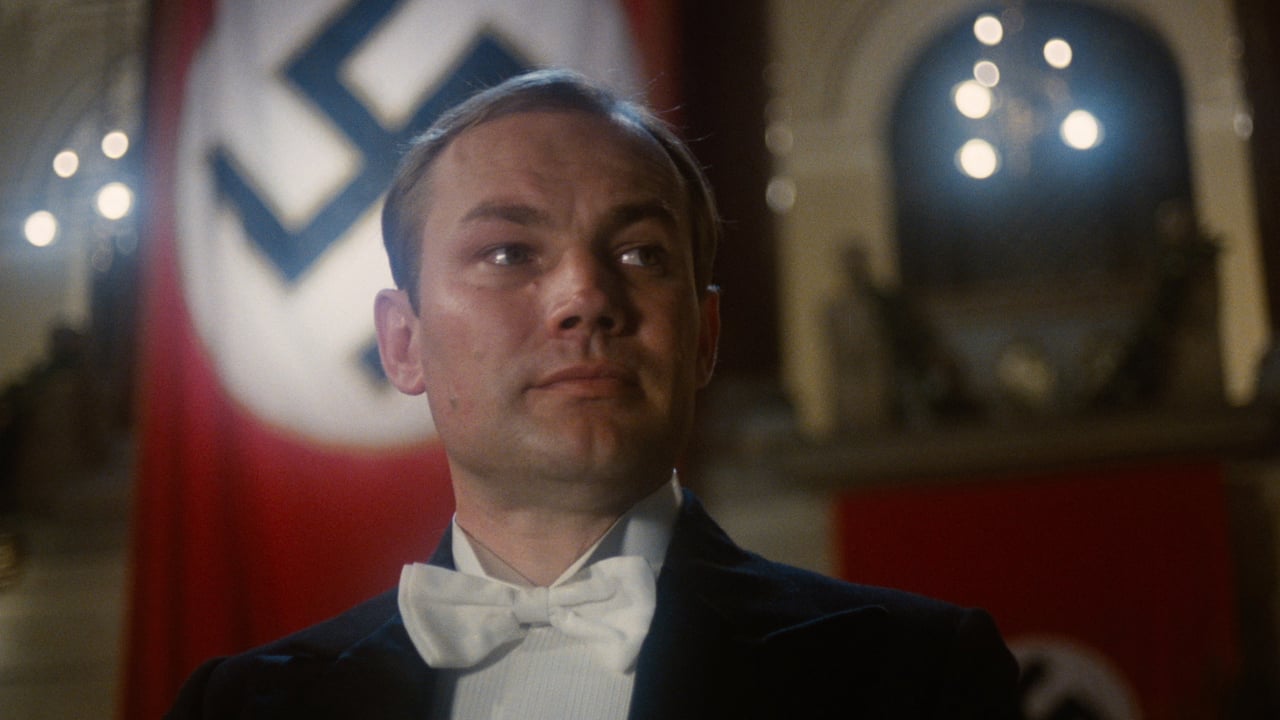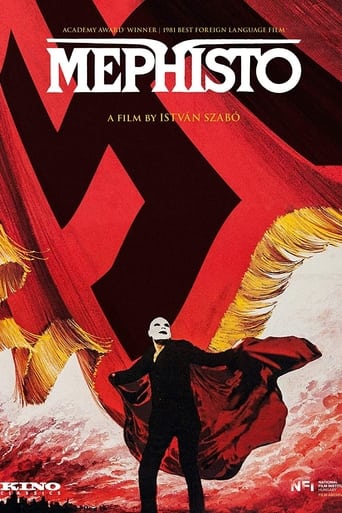Incannerax
What a waste of my time!!!
GamerTab
That was an excellent one.
Peereddi
I was totally surprised at how great this film.You could feel your paranoia rise as the film went on and as you gradually learned the details of the real situation.
Gurlyndrobb
While it doesn't offer any answers, it both thrills and makes you think.
michaelgfalk
Mephisto is disquieting, ironic movie. Its star is Klaus Brandauer, who plays Henrik Hoefgen, a German actor slumming it in Hamburg in the 1930s, and dreaming of stardom just as the Nazis come to power. His moral challenge is obvious: to resist the Nazis, or work within the system? Brandauer is fabulous through the movie's twists and turns, and though occasionally clumsy, manages to convey Hendrik's timidity, self-deception, pride and guilt as he moves through a violent and chaotic world.The movie is based on Klaus Mann's novel of the same title. Mann was part of a literary dynasty. His father was Thomas Mann, the famous Nobel-prizewinning writer of "Buddenbrooks," "The Magic Mountain," and "Death in Venice." His uncle was Heinrich Mann, a no less famous writer in his day, known to film-goers as the writer of "Professor Unrat," which became the great Marlene Dietrich film "Der Blaue Engel."The movie, in a way, plays out the debate that the two elder Mann brothers had about art and politics. Thomas always felt aloof from politics, ensconced in the purer regions of art and culture. During WWI, he published a book called "Reflections of an Unpolitical Man," whose title says it all. Heinrich was a satirist, who believed that art must contribute to the betterment of society, and that it could not avoid being political. Their debate continued into the Nazi era, though to say how their minds changed would spoil this film."Mephisto" is occasionally a little obvious or simplistic, and some of the minor characters are unconvincing, but Brandauer shines in the main role, and the music, set design and camera-work are superb. A scene early in the movie, when the Hitler Youth meet in the street, looks and sounds like a sick parody of Riefenstahl.This will always be a timely film, and certainly earned its Oscar.
SnoopyStyle
It's pre-War Germany. Theater actor Hendrik Hoefgen (Klaus Maria Brandauer) becomes successful playing Faust. The Nazis take a liking to him and the play. Hoefgen starts abandoning his principles to ingratiate himself with the powerful Nazis. He essentially sells his soul to achieve his dreams which is the same as the character Faust.Klaus Maria Brandauer is a great actor and he always commands the screen. The story is poetic and presents a compelling idea. The static camera style left me a bit cold. At a certain point, I stop caring about Hoefgen. I don't necessarily care about any of the other characters either. I like the concept a lot more than the actual movie.
chaos-rampant
This is not as deeply felt as Tarkovsky, nor as ambiguously sketched as Resnais. It works from a 'real world', a historic one at that. But it's a good film because it's committed to clearly spin and align the different layers of self.The story is Faust, both the film and the play-within. Our film is about an actor who sells his soul for a gilded life on the stage, the play is where he is Mephisto - not Faust - and tries to reason with his decision to be Faust, and a third layer is about an era, Nazi Germany in the early years that was also about a Faustian bargain and staged images of power. The protagonist is an actor from the German stage and plays one. It has a Hungarian filmmaker at the helm who knows probably too well the type of life from the Eastern Bloc.So this succeeds where Hollywood's Cabaret felt contrived and false, because everyone is a step closer to the nervous soul of that world.Something is quite brilliantly handled here, and I believe it's this; one of the conceits of our actor, a leftist in the early days, is for a Peoples Theater that directly involves and agitates into action. Of course that's all gone when the Nazis come into power, with their Wagnerian notions on the ideal and the pure. He has to do Hamlet, the ambition however is still the same, a play that involves the audience, but in this environment seems ludicrous and hypocritical. It's a state-sponsored event after all. Now we see several excerpts of Faust, and more shots of our man backstage in pale Mephisto make-up acting the role in real life, but we never see Hamlet. We never see just how he intended this Peoples Theater. We skip to the curtain call and rapturous audience applause.But of course, the main thrust of the film is that of a man, and later society, that simply doesn't know where the stage ends and life begins. His way of involving the people, in a broad sense, is acting out in this world that is all about posturing and pretending, but doing so in a way that actually saves lives.The man can thrive in this world, because the world has shifted to align with what he was all along. He doesn't become true, the world becomes as false as he is. It's the stage and lights that shift, so when the narrative planes align for us, we understand that all along he was a decent human being. The chilling finale has him on that stage that is the yawning void where the machinery of self is decided. Just who controls the lights that he acts to?
aussiebrisguy
What can one say about this film apart from it being totally brilliant? Klaus Maria Brandauer is ideally cast in the role of Hendrik Hoefgen. The character of Hoefgen is a thinly disguised version of the famous German actor and Director of the Prussian State Theatre in Berlin, Gustav Grundgens. Grundgens compromised with the National Socialist authorities under Hitler to retain his role in the theatre. Others left as they did not want to be associated with the Third Reich and all its horrors. Marlene Dietrich was one such person. Grundgens remained. This film is a classic for any drama student as it shows the state of theatre in Germany before the rise of the Third Reich in Germany. It very clearly depicts theatre pre-1918 and also the early and important work of Bertolt Brecht. The thuggery of the Nazi German regime is clearly exposed with all the filth who polluted the upper echelons of society down to the working man. This is a brilliant piece of film making. Don't miss it as it is gripping drama.

